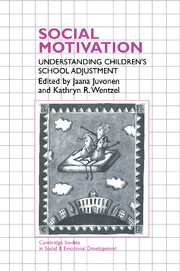Crossref Citations
This Book has been
cited by the following publications. This list is generated based on data provided by Crossref.
Wigfield, Allan
Eccles, Jacquelynne S.
and
Rodriguez, Daniel
1998.
Chapter 3: The Development of Children’s Motivation in School Contexts.
Review of Research in Education,
Vol. 23,
Issue. 1,
p.
73.
Donahue, Mavis L.
Szymanski, Carol M.
and
Flores, Christine Wujek
1999.
When "Emily Dickinson" Met "Steven Spielberg".
Language, Speech, and Hearing Services in Schools,
Vol. 30,
Issue. 3,
p.
274.
Ryan, Allison M
and
Patrick, Helen
2001.
The Classroom Social Environment and Changes in Adolescents’ Motivation and Engagement During Middle School.
American Educational Research Journal,
Vol. 38,
Issue. 2,
p.
437.
Juvonen, Jaana
2001.
Student Motivation.
p.
61.
Pombeni, Maria Luisa
Zappal, Salvatore
and
Guglielmi, Dina
2002.
Expérience scolaire et développement psychosocial : une recherche sur les adolescents.
L’Orientation scolaire et professionnelle,
Eccles, Jacquelynne S.
and
Wigfield, Allan
2002.
Motivational Beliefs, Values, and Goals.
Annual Review of Psychology,
Vol. 53,
Issue. 1,
p.
109.
MacCallum, Judith
2002.
Trends and Prospects in Motivation Research.
p.
121.
Hareli, Shlomo
and
Weiner, Bernard
2002.
Social Emotions and Personality Inferences: A Scaffold for a New Direction in the Study of Achievement Motivation.
Educational Psychologist,
Vol. 37,
Issue. 3,
p.
183.
Patrick, Helen
Turner, Julianne C.
Meyer, Debra K.
and
Midgley, Carol
2003.
How Teachers Establish Psychological Environments during the First Days of School: Associations with Avoidance in Mathematics.
Teachers College Record: The Voice of Scholarship in Education,
Vol. 105,
Issue. 8,
p.
1521.
Furrer, Carrie
and
Skinner, Ellen
2003.
Sense of relatedness as a factor in children's academic engagement and performance..
Journal of Educational Psychology,
Vol. 95,
Issue. 1,
p.
148.
Patrick, Helen
Turner, Julianne C.
Meyer, Debra K.
and
Midgley, Carol
2003.
How Teachers Establish Psychological Environments during the First Days of School: Associations with Avoidance in Mathematics.
Teachers College Record: The Voice of Scholarship in Education,
Vol. 105,
Issue. 8,
p.
1521.
Bouchey, Heather A.
2004.
Parents, teachers, and peers: Discrepant or complementary achievement socializers?.
New Directions for Child and Adolescent Development,
Vol. 2004,
Issue. 106,
p.
35.
Ryan, Allison M.
Kiefer, Sarah M.
and
Hopkins, Nathaniel B.
2004.
Motivating Students, Improving Schools: The Legacy of Carol Midgley.
Vol. 13,
Issue. ,
p.
301.
Kaplan, Avi
2004.
Motivating Students, Improving Schools: The Legacy of Carol Midgley.
Vol. 13,
Issue. ,
p.
97.
Ang, Rebecca
2005.
Development and Validation of the Teacher-Student Relationship Inventory Using Exploratory and Confirmatory Factor Analysis.
The Journal of Experimental Education,
Vol. 74,
Issue. 1,
p.
55.
Rathunde, Kevin
and
Csikszentmihalyi, Mihaly
2005.
The Social Context of Middle School: Teachers, Friends, and Activities in Montessori and Traditional School Environments.
The Elementary School Journal,
Vol. 106,
Issue. 1,
p.
59.
Cowie, Bronwen
2005.
Student commentary on classroom assessment in science: a sociocultural interpretation.
International Journal of Science Education,
Vol. 27,
Issue. 2,
p.
199.
Cowie, Bronwen
2005.
Pupil commentary on assessment for learning.
The Curriculum Journal,
Vol. 16,
Issue. 2,
p.
137.
Azmitia, Margarita
Ittel, Angela
and
Brenk, Charlotte
2006.
Peer Relationships in Cultural Context.
p.
426.
Volet, Simone
and
Mansfield, Caroline
2006.
Group work at university: significance of personal goals in the regulation strategies of students with positive and negative appraisals.
Higher Education Research & Development,
Vol. 25,
Issue. 4,
p.
341.



